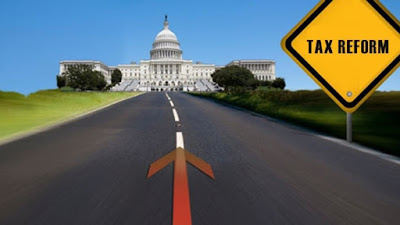By Marc Chandler.
Yesterday US President Trump formally launched his campaign for tax reform. The Big Six (Mnuchin and Cohn for the administration, McConnell, and Hatch from the Senate and Ryan and Brady from the House) had been meeting and were to craft a reform bill.
Last week the Administration changed tactics and essentially withdrew from the process, leaving Brady, the Chair of the House Ways and Means Committee. Trump. Rather than a detailed plan that had been promised, Trump provided a few basic principles, like simplification (so that most Americans can file a return on one page), lower corporate tax schedule and an incentive to corporations to repatriate the earnings retained offshore.
The Administration has also indicated, it is interest no longer allow state and local income taxes to be deducted from the federal tax obligations. If it does materialize, it would be a significant impact for households, especially in high tax areas. Other deductions, like for mortgage interest, approved retirement savings (e.g., 401k), and charitable contributions will be retained.
Cohn recently suggested that the tax reform bill will be drafted over the next 4-5 weeks. This seems quite ambitious given the difficult issues for which the Big Six apparently made little substantive progress. Moreover, September is a “short month” for Congress, and there at least two more pressing issues; namely the debt ceiling and spending authorization.
One would think that with a Republican majority in Congress and the White House, that there should be no question of default (debt ceiling) or government shutdown (spending authorization). However, the majority is in name only. We have argued that the fissures within the Republican Party may be greater than some inter-party differences.
The same split, represented by the Freedom Caucus, on the one hand, and the more moderate Tuesday Group on the other, which prevented health care reform, appears to be frustrating Mnuchin’s desire for a clean increase in the debt ceiling. The Freedom Caucus, or at least some of its members, are seeking concessions in the form of extra spending cuts in exchange for lifting the debt ceiling. Recently President Trump threatened to allow the government to shut if Congress does not authorize spending for the controversial wall on the border with Mexico.
There is a new wrinkle in this that investors will want to monitor going forward. A couple of weeks ago (August 17) rumors that Cohn was considering resigning from his post as the Administration’s National Economic Council over the President’s handling of the violence in Charlottesville, the equity market swooned. Cohn was seen as a moderate voice representing business interests. He did not resign, though admitted to thinking about it. In any event, there are reports that there has been a falling out with the President. Yesterday, although Cohn was with the President on the trip to Missouri where Trump gave his pep talk on taxes, Trump neglected to thank him for his work on taxes. Everyone else traveling with Trump was identified and thanked by name, including Ivanka, his daughter, and senior adviser.
Although we would not make a big deal of Cohn not being mentioned by name, many are scratching their heads. Trump has been publicly vocal in criticism of cabinet members, like Sessions and Tillerson. However, there are a few strikes against Cohn. First, was Cohn’s public criticism of the President and his call for a higher standard. A week later Trump pardoned former Sheriff Arpaio who was found guilty of contempt of court for racially profiling. There is some talk that Arpaio is considering running against Senator Flake, a Republican Senator who has been critical of Trump.
Second, the market response to rumors of Cohn’s resignation overshadowed Trump, which is not acceptable, it seems. Third, Cohn did not deliver a detailed tax plan, and this appears to have forced Trump to adjust his strategy. He has already complained about the “do nothing Congress, ” and this could be the rallying cry of a slate of Trump candidates that could challenge the sitting Republicans in next year’s primaries.
There is another implication as well. Cohn has long been rumored to be the most likely successor to Yellen at the head of the Federal Reserve. When asked about it recently, NY Fed President and previously at Goldman, Dudley said Cohn was a reasonable candidate. Some journalists called this an endorsement. It did not seem like that. Dudley was asked and did not volunteer the assessment. And this is as neutral of an answer that one can imagine. It was not an endorsement, but an acknowledgment. Anything else would have put the NY Fed President in an awkward position. In what appears to be the consensus narrative, former employees of Goldman Sachs are some homogeneous group, but what has been brought into relief in the first part of Trump’s presidency is that there are stark differences among this cohort, and not that Bannon, for example, also worked at Goldman.
Some thought that Yellen’s speech at Jackson Hole mostly devoted to defending the regulatory regime that has emerged since the Great Financial Crisis was her way of acknowledging she was not going to be reappointed as Fed Chair. This may not be a formidable obstacle. Many financial institutions seem to want some modification of parts of Dodd-Frank, but few seem to want to return to status quo ante. We note that currently, PredictIt shows Cohn and Yellen in a dead heat.
http://www.marctomarket.com/



